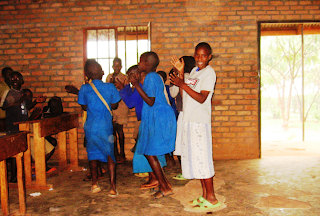Part I-The Carry
While I am not a huge fan of television in general I am a fan of the episode of Seinfeld in which George’s father wants to celebrate Festavist. (Sorry, I don’t really know how he spelled that?) I like that as a part of that celebration he wanted to include feats of strength; I like this as I have long been a fan of hernia inducing activities in general. I believe George’s father, as he obviously appreciates gut busting acts of strength, would find that many of the people in Rwanda
I am lucky as my commute to work here in Rwanda
 |
| Look closely for the potato carry. |
These feats of strength that I pass by can range from the simple, to the extreme, to the truly outlandish so that sometimes I think they may even just be showing off a little bit. Therefore, I thought I would work my way through these displays of muscle supremacy starting with the ones that are mere child’s play to those that should earn the performer a spot on some Olympic team somewhere if not become an Olympic sport in of itself.
Water Carry: I have seen children as young as three or four years old to persons as old as a person can get carrying jeri cans full of water down lengthy stretches of road. They carry these jeri cans after completing feats of patience by waiting in a long line that can be up to fifty plus people waiting to fill their container. After these displays of patience, some then carry one measly two or three gallon jug to and from the local water source and home while others may carry a five to ten gallon container. The folks in the one jug competition are usually the little tikes in their blue or gold school uniforms carrying the cans home through the early morning mist as fast as their little legs can carry them before dashing off to school where additional water carrying may be required. Many of the participants in the water jug on the head competition are mothers who tend to carry the container on their head with a baby strapped to their back or in their arms. Although they also can be in the single container carry, they add to the feat with the baby strapped to their back and an additional load of pineapples or some other fruit or vegetable in a basket or bag balanced on their head. Others like to get a bit more ambitious and go for one in each hand with a third jeri can or some other load balanced on their head to show their prowess. Can you imagine this? Carrying three, ten gallon jeri cans; one on your head and one in each hand? I see it, am amazed by it and realize that while I may be able to compete in the two jeri can competition, and that would be at *short distances only, when it comes to adding the final third container to my head I fear even the trying.
*Short Distance = ten feet on a good day.
Miscellaneous Carry: I suppose I need to state again that these carrying feats also run the range in ages from old enough to walk, so evidently old enough to carry to old enough to not to have to. I have spent the last two Saturdays out in an area near some of the schools I am working with and see that most of those students spend their Saturdays collecting and then carrying wood piled on their head. Large pointy piles neatly stacked and tied on their heads. These students are in rather large groups plying up and down the dusty dirt road so I wonder if it is a kind of social event barring little chance for any others. In similar vein it is now the peanut harvest and folks of all ages and sizes are carrying large bundles of peanut vine home from the fields so that they can then separate the tiny peanuts from their shells for their own use and to sell at the market. Bundles of beans, corn, sorghum, and any other similar crops get the same treatment. Potatoes, sweet and Irish, get to add to a carriers’ prestige by being loaded into sacks of unbelievable proportions to be again carried on one’s head, or so heavily loaded onto a bike that the bike is barely visible as the bicyclist pedals down the road, or pushes the load up a long steep hill. I have also seen large rocks, carried on a person’s head, goats slung over shoulders, enormous pots of corn mash hiked up to a person’s cranium and then carried balanced down the road, like so many other loads famously balanced on people’s heads here.
 People have to carry goods and life’s necessities as the vast majority do not have cars, and even fewer have trucks, four-wheelers, or even a wheel barrel. Strewn alongside the road then are a kind of circular head cushion fashioned from vegetation to carry things on, and for which I have a photo. I do not have many photos for this topic as I am usually on the motorcycle when I witness the majority of these feats of strength and it is just not the sort of thing you can predict or stop and photograph-although I yearn to do so. I made the mistake early on of waving to folks or giving them the thumbs up because I was so impressed with their efforts, but soon learned that being the friendly and polite people that Rwandans are they would instinctually wave and nearly lose the load they were carrying. Ah, sorry.
People have to carry goods and life’s necessities as the vast majority do not have cars, and even fewer have trucks, four-wheelers, or even a wheel barrel. Strewn alongside the road then are a kind of circular head cushion fashioned from vegetation to carry things on, and for which I have a photo. I do not have many photos for this topic as I am usually on the motorcycle when I witness the majority of these feats of strength and it is just not the sort of thing you can predict or stop and photograph-although I yearn to do so. I made the mistake early on of waving to folks or giving them the thumbs up because I was so impressed with their efforts, but soon learned that being the friendly and polite people that Rwandans are they would instinctually wave and nearly lose the load they were carrying. Ah, sorry.Up next…building a country’s infastructure one swing of a pick axe at a time.












